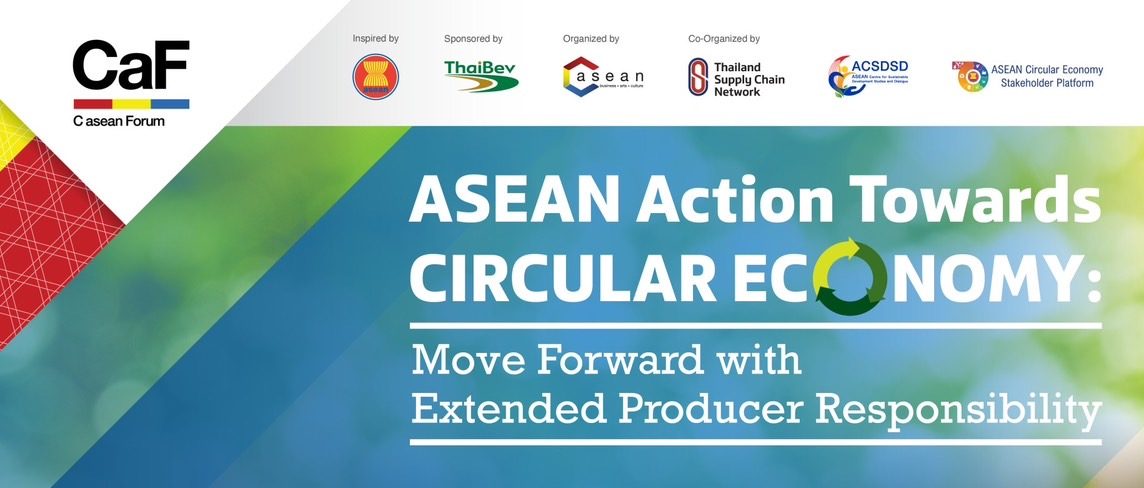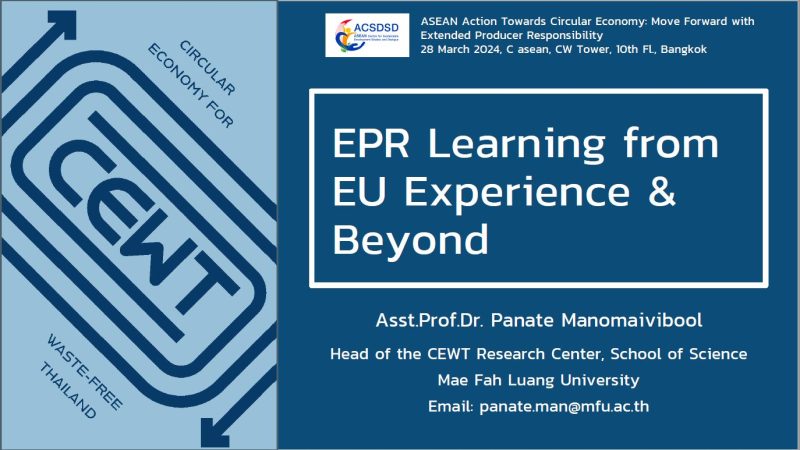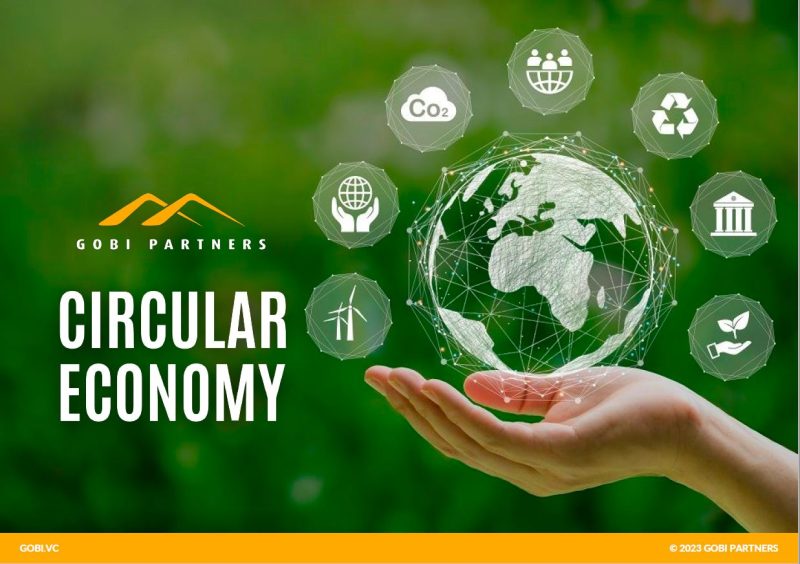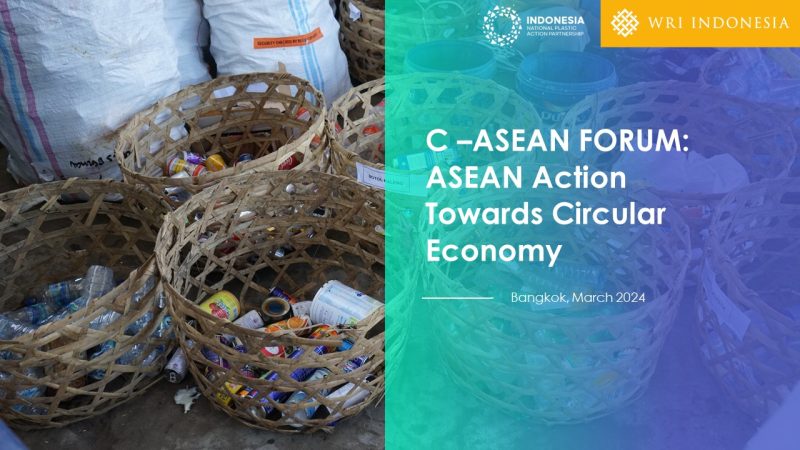C asean Forum 2024: ASEAN Action Towards Circular Economy: Move Forward with Extended Producer Responsibility is a collaborative effort organised by the ASEAN Centre for Sustainable Development Studies and Dialogue (ACSDSD), the C-asean and Thailand Supply Chain Network. Its primary objective is to foster a collaborative and informed dialogue, inspiring actionable strategies for adopting EPR across the ASEAN region. By bringing diverse perspectives and experiences together, the event seeks to develop a roadmap for incorporating EPR principles into national policies, industry practices, and community initiatives. The ultimate vision is to propel ASEAN towards a Circular Economy that safeguards the environment and catalyses economic growth and social well-being. This conference stands as a testament to ASEAN’s commitment to sustainable development and responsible resource management, setting the stage for a future where circularity is not just an aspiration but a shared reality.
Below is the compilation of knowledge items from the forum:
Mr. Kai Hofmann, Program Head at GIZ, enlightened attendees on “EPR in the ASEAN Region.” His presentation provided valuable insights into the opportunities and challenges of embracing circularity, setting the stage for deeper discussions.
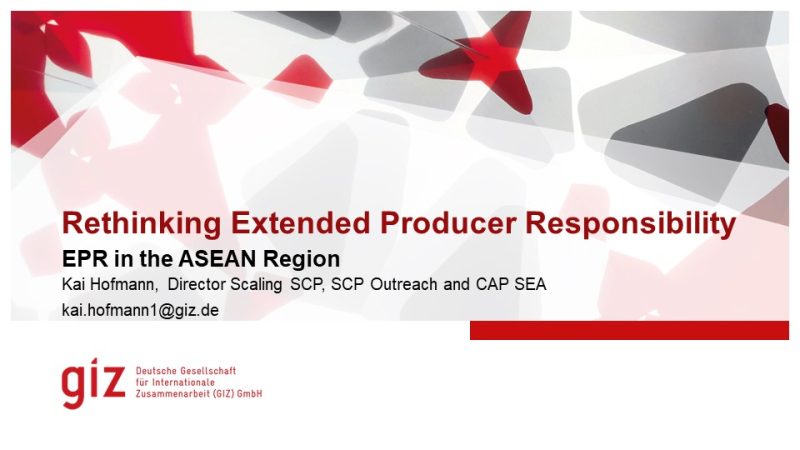
DOWNLOAD KAI HOFMANN’S PRESENTATION
Dr Panate Manomaivibool, Partner of the EU SWITCH-Asia Programme and Mae Fah Luang University professor continued the journey and shared valuable insights on “EPR Learning from EU Experiences.” His expertise enriched the dialogue, fostering collaboration towards Extended Producer Responsibility (EPR) in the region.
DOWNLOAD DR PANATE’S PRESENTATION
A panel discussion session titled “Promoting Extended Producer Responsibility (EPR) Across ASEAN” delves into the intricacies of implementing Extended Producer Responsibility (EPR) within the ASEAN region. Drawing from a wealth of expertise and regional experiences, the session aimed to facilitate collaboration and knowledge exchange to address the challenges and opportunities associated with waste management and circular economy principles. During the panel discussion
Carlo Chen-Delantar, a prominent figure in social entrepreneurship and circular economy initiatives, initiated the discussion by probing the EPR hotspots in the Philippines and seeking insights on lessons that the country could glean from other ASEAN counterparts. With his extensive background in responsible investments and tech ecosystem development, Carlo Chen-Delantar’s inquiry set the stage for a comprehensive exploration of the Philippines’ role in advancing EPR practices within ASEAN. Carlo continued the discussion by examining the evolution of public-private partnerships in facilitating financing for EPR and circular economy projects, particularly in the Philippines and other regional contexts. His inquiry delved into the implications of transitioning the Solid Waste Management Act into EPR law in the Philippines, shedding light on the evolving landscape of sustainable waste management practices.
Rocky Pairunan from the World Resources Institute delved into Indonesia’s socio-economic and environmental context, addressing the challenges and opportunities in implementing EPR for plastic waste management. His inquiry underscored the necessity of tailored strategies and incentive mechanisms to encourage businesses to embrace EPR practices and invest in sustainable production and waste management systems, highlighting the critical role of regulatory frameworks in driving change. Rocky further elaborated on the Indonesian government’s collaborative efforts with stakeholders, including industry players, civil society organisations, and international partners such as the European Union, to develop and implement effective EPR policies and regulations for plastic waste management. His contribution highlighted the significance of multi-stakeholder engagement in driving sustainable solutions to combat plastic pollution in Indonesia and beyond.
Dr. Panate Manomaivibool, an esteemed environmental policy expert, led discussions on fostering collaboration among ASEAN member states to harmonise EPR regulations and standards. His expertise in solid waste management and policy evaluation provided valuable insights into ensuring consistency and coherence in EPR implementation across the region, emphasising the need for collaborative efforts to address shared environmental challenges effectively during the discussion, Professor Panate expanded the discourse by exploring the potential of EPR+ in addressing the pressing issue of marine debris in ASEAN. His insights offered a holistic perspective on how integrating additional measures into EPR frameworks could mitigate marine pollution, underscoring the importance of comprehensive solutions to safeguard marine ecosystems.
The panel discussion concluded with a consensus on the imperative of collective action and collaborative partnerships to accelerate the adoption of EPR and advance circular economy principles across ASEAN, laying the groundwork for a more sustainable future in the region.
Key Takeaways from the panel discussion are:
- Focus on Local Contexts: Experts emphasised the importance of understanding each ASEAN member state’s unique socio-economic and environmental context when implementing EPR. This approach ensures tailored strategies and incentive mechanisms to encourage businesses to embrace EPR practices effectively.
- Need for Regulatory Frameworks: Regulatory frameworks are crucial in driving change towards sustainable waste management practices. Harmonising EPR regulations across ASEAN member states can ensure consistency and coherence in implementation, facilitating collaboration and addressing shared environmental challenges effectively.
- Integration of Additional Measures: Discussions highlighted the potential of integrating additional measures, such as EPR+, into existing frameworks to address pressing environmental issues like marine debris. This holistic approach emphasises the importance of comprehensive solutions to safeguard marine ecosystems.
- Importance of Collaboration: The panel concluded with a consensus on the imperative of collective action and collaborative partnerships. Multi-stakeholder engagement, including


